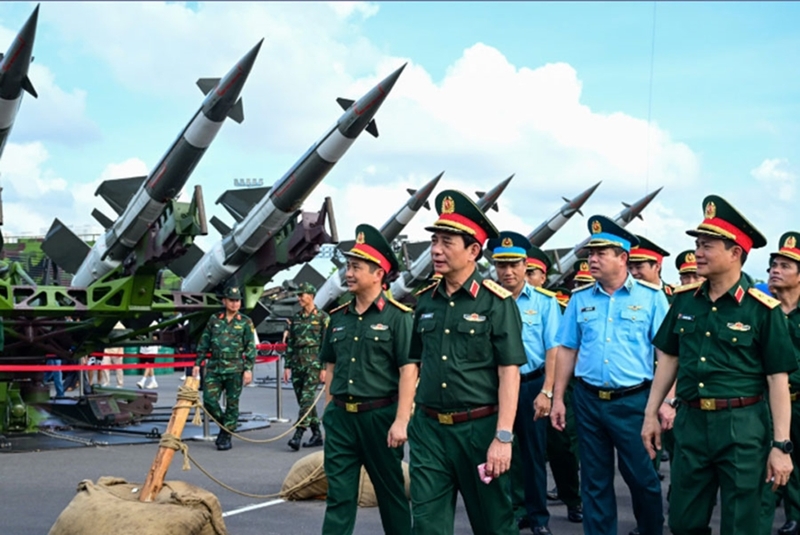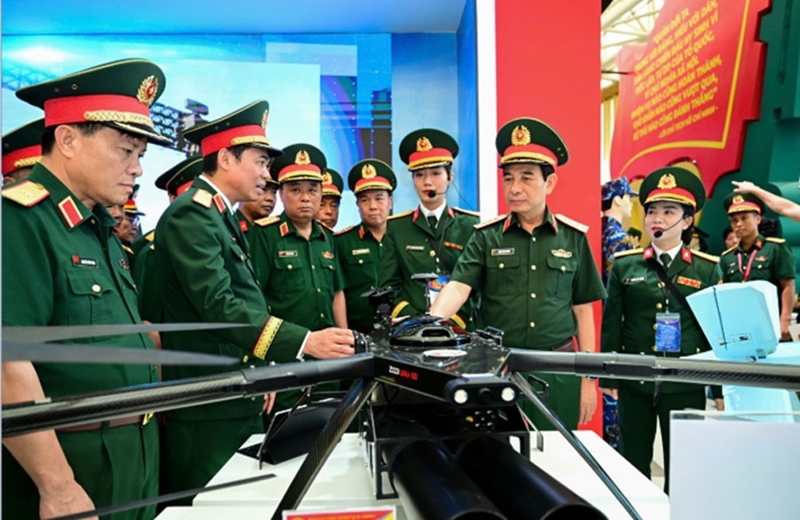The Central Military Commission and the Ministry of National Defense have united the entire military to overcome difficulties and successfully fulfill all 15 major task groups set by the 11th Military Party Congress. Many missions have been accomplished well, some with excellence, and several even completed ahead of schedule, leaving important historical imprints.
    |
 |
|
General Phan Van Giang inspecting the Ministry of National Defense’s outdoor display area at the exhibition of national achievements |
The military has successfully performed its advisory role for the Party and State on defense and security issues. It has pro-actively researched, assessed, and forecast situations, ensuring timely and effective responses. These efforts have contributed to safeguarding national interests at the highest level and protecting independence, sovereignty, unity, and territorial integrity, thus maintaining a peaceful environment for national development. The military has also proposed strategies, mechanisms, and policies to improve the legal framework, strengthening the Party’s absolute leadership over and the State’s unified management of the military and defense and military affairs.
The restructuring and streamlining of forces has been largely completed, making the military more elite, more compact, stronger. The overall quality, strength, competence, and combat readiness capability of the forces have improved significantly, ensuring preparedness for all scenarios. The military has also effectively addressed non-traditional security challenges, disaster response, and search-and-rescue operations. Efforts to develop the maritime defense economy and strengthen core defense potential have been implemented, while logistics and technical support for all missions have been ensured.
The defense industry has achieved notable breakthroughs. The military has mastered key technologies and successfully researched, manufactured, and tested modern weapons with strategic significance. Financial management, investment, military science, digital transformation, and administrative reform have also been advanced comprehensively and effectively. Defense diplomacy and international integration have remained key pillars of national foreign policy, contributing to enhancing the position and prestige of Vietnam and its military globally, protecting the Fatherland early and from afar, keeping regional and global peace.
The Military Party Organization has been built to be healthy, strong, and exemplary, with enhanced leadership capacity and combat strength. The military has remained politically steadfast and professionally competent, serving as the core force in defending the Party’s ideological foundation. The noble qualities of Uncle Ho’s soldiers continue to shine brightly.
In the coming years, global developments are expected to remain fast-paced and complex, with multipolarity, fragmentation, and competition intensified. While peace, cooperation, and development remain overarching trends, they are accompanied by new challenges. Major powers will continue to adjust strategies, balancing cooperation with confrontation, while intervening in the domestic affairs of other countries. Conflicts are evolving into more dangerous forms, with risks of wider escalation.
The Fourth Industrial Revolution, particularly advances in artificial intelligence and the Internet of Things, will profoundly impact all sectors. Territorial and maritime disputes, including in the East Sea (also known as South China Sea), will continue to be complicated. ASEAN will work to strengthen cooperation and affirm its central role, but will face increasing challenges, while border disputes in some countries remain complicated.
Domestically, nearly 40 years of renewal have brought Vietnam significant achievements. Efforts to streamline political institutions, promote science, technology, innovation, and digital transformation, combined with strategic decisions of the Party Central Committee, are creating historic opportunities for breakthroughs in development and military building. Yet challenges remain. Hostile forces continue plotting against the Party, State, and armed forces; non-traditional security challenges, especially climate change, natural disasters, and pandemics, are increasingly unpredictable. Safeguarding the socialist Fatherland faces growing difficulties, while building a revolutionary, regular, elite, and modernized military requires higher standards.
    |
 |
|
General Phan Van Giang inspecting the Ministry of National Defense’s booth at the exhibition on national achievements |
In this new environment, the Military Party Organization and the entire military must remain pro-active in monitoring global, regional, and domestic developments; thoroughly grasp the Party’s guidelines on defense and security and Fatherland protection in the new era; and uphold the Party’s absolute and direct leadership in all aspects and the State’s centralized and unified management of the military and the cause of national defense and Fatherland protection. For the 2025-2030 term, nine key missions have been identified.
First, the military should enhance strategic research and advisory capacity in defense and security to ensure timely, accurate, and effective responses, while firmly safeguarding independence, sovereignty, and territorial integrity; protecting the Party, State, people, and socialism; ensuring the national interests at the highest level. In addition, agencies and units should prevent and defeat hostile schemes of “peaceful evolution,” subversion, and attempts to depoliticize the military; propose response guidelines and strategies in the contact of the impacts of globalization, international integration, risks of trade wars, high-tech wars, and technological monopolies.
Second, it is essential to mobilize and use resources effectively to build a revolutionary, regular, elite, and modernized military; a strong, modern all-people national defense and defense posture; and robust military regions and defensive areas linked with building a solid “people’s heart posture.” The military must effectively respond to both traditional and non-traditional security challenges. It should study adjustments to the overall national defense posture in association with economic, cultural, social, and foreign affairs development, in line with new administrative boundaries as well as the forms of warfare and modern methods of combat.
Third, the whole military must improve the quality of training, education, and human resource development to meet the requirements of new tasks and high-tech warfare, thereby creating high-quality human resources for the military and the country.
Fourth, forces must ensure comprehensive, timely, and flexible logistics and technical support for all missions and the development of the military in the new period; focus on preserving, maintaining, and mastering weapons and equipment, ensuring technical readiness; invest in new technologies for the research, development, and maintenance of weapons and technical equipment, especially new and modern systems, as well as the production of technical materials. Breakthroughs should be made in developing the defense industry towards self-reliance, self-sufficiency, resilience, dual-use capability, and modernization. Focus should be made on investing in mastering foundational, core, advanced, and dual-use technologies in research, design, manufacturing, upgrading, and modernizing strategic, modern defense industry products, weapons, and technical equipment. Agencies and units should pro-actively engage in cooperation, technology transfer, and the promotion of exports of high-value, high-tech products, while participating in global supply chains; complete projects and programs to achieve key criteria on defense industry development as set forth in the criteria for building a modernized military.
Fifth, focus should be put on accelerating the development and application of science, technology, innovation, and digital transformation in the military; attracting and effectively using talented individuals to meet the requirements of building a revolutionary, regular, elite, and modernized People’s Army.
Sixth, agencies and units must reform and improve the efficiency of financial management; comprehensively implement the project on reforming financial management mechanisms in the military; mobilize and use resources effectively to fulfill tasks and strengthen national defense potential; closely combine economic development with national defense consolidation; effectively implement projects on strengthening defense in conjunction with socio-economic development along strategic directions.
Seventh, it is a must to build and complete synchronous institutions, mechanisms, and policies in military and defense affairs; enhancing law enforcement capacity among forces tasked with duties in border, maritime, and island areas; firmly safeguarding the Fatherland in cyberspace and other new strategic domains; strengthening legal affairs, inspection, judicial reform, and state management of the military and defense sector.
Eighth, it is necessary to strengthen defense diplomacy capacity, effectively participate in international integration and comprehensive defense diplomacy in both bilateral and multilateral frameworks, continuing to serve as a pillar alongside Party diplomacy, State diplomacy, and people-to-people diplomacy; actively and responsibly engage in United Nations peacekeeping operations; cooperate effectively to address traditional and non-traditional security challenges, creating a favorable international environment, thereby enhancing the country’s and the military’s potential, position, and prestige, and safeguarding the Fatherland early and from afar.
The last one is building a politically strong military and a comprehensively healthy and strong, exemplary, and outstanding Military Party Organization; fostering a contingent of cadres and Party members with steadfast political will, pure moral qualities, strong professional competence, and absolute loyalty to the Fatherland, the Party, the State, and the people.
The mission of building the military, strengthening defense, and safeguarding the Fatherland in the new era sets forth new demands. The Military Party Organization, officers, Party members, and soldiers must build on more than 80 years of glorious tradition, seize opportunities, overcome challenges, and fulfill the objectives of the 12th congress, thus building a revolutionary, regular, elite, and modernized military, capable of firmly defending the Socialist Republic of Vietnam, contributing to building a prosperous and happy nation, and remaining worthy of the trust of the Party, the State, and the people.
Minister of National Defense, General Phan Van Giang
Translated by Tran Hoai